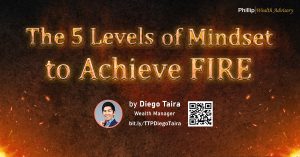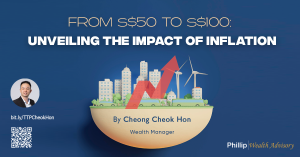Are you a ‘HENRY’? July 27, 2023

The term “Henry” or “High-earner not rich yet” was coined by Shawn Tully of Fortune magazine back in 2003 to describe individuals with an annual income of US$250,000–US$500,000. Melkorka Licea wrote in her article with The New York Post in 2019 that Henrys — referring to millennials earning a six-figure income annually with re-adjusted estimated value of US$100,000–US$250,000 ($134,696– $336,739) — are finding themselves financially strapped as their expenses creep up while their saving remains stagnant.
While income is commonly used as a gauge to determine a Henry, I have observed that different articles may have varying criteria. Hence, identifying a Henry can sometimes come down to a matter of spending habits rather than income alone. With a higher disposable income, Henrys often become the targets of luxury brands, travel companies and marketing campaigns that encourage them to spend excessively.
With the constant stream of enviable posts of extravagant lifestyles on our social media feeds, one might find themselves questioning “Why am I working so hard and feeling so stressed up for?” I wouldn’t call it keeping up with the Joneses as even friends and acquaintances may also fall into the category of a Henry.
If you have watched Bling Empire on Netflix, you might notice that people of similar status tend to hang out in the same circle. Can you imagine the power of a single Henry encouraging another Henry to save and invest for retirement instead? Talk about the multiplier effect!
A Henry might end up having little in savings for contingencies, not to mention being sufficiently prepared for retirement. As cliché as it may sound, I make it a point to advise my clients to “Pay yourself first” before everybody else (merchants, travels, liabilities). You need to set aside capital to generate passive income that can sustain the lifestyle you want not just for today but for tomorrow as well.
To avoid becoming a Henry, the issue is not just about how much they should set aside but rather how much they should start paying themselves first. They may start with a certain percentage of their income and gradually increase that allocation as their earnings continue to grow. This approach helps to create a subconscious receptiveness to building wealth.
To illustrate this, let me draw a parallel of this concept to that of driving. When you are used to driving a specific route every day, you may find yourself subconsciously following the same route even if you have made a mental note to try a different one today. Similarly, assisting my Henry clients to adjust to subconscious wealth-building habits is my end goal; starting from structured routines and providing encouragement to foster these habits.
Lastly, a significant portion of Henrys have children and are often the first role models for them. Through leading by example, wouldn’t it be more likely for their next generation to be capable of building their own wealth and be responsible for their personal wealth management?
Melkorka Licea made reference to an article by Hillary Hoffower, “While there are certain markers to identify Henrys, such as someone earning over US$100,000, they are ultimately defined by how they live their lives: They live a comfortable lifestyle above their means and struggle to balance while saving for the future. It is a combination of habits that puts them on a slow path to wealth building and leaves them feeling financially strapped.” Unfortunately, genes might not be the only thing that is passed on to the next generation. Subconsciously, the financial suffocation will also be “inherited” inevitably.
To put it simply, Henrys often lead extravagant lifestyles, primarily supported by their earned income. However, unforeseen circumstances such as retrenchments, illnesses or old age can unfortunately abruptly disrupt and potentially end this lifestyle if the earned income is not converted to capital to generate passive income to further build wealth.
The greatest advantage of a Henry is the high disposable income they possess. When this income is re-directed from spending on liabilities towards asset building, they can accelerate their wealth growth and achieve financial independence at an earlier age. Ultimately, Henrys have the freedom to make choices and decisions that would shape their financial futures.
Contributor:

Henry Tan
Wealth Manager
Phillip Securities Pte Ltd (A member of PhillipCapital)
https://bit.ly/TTPhenrytan
Reference:
- [1] https://nypost.com/2019/10/23/millennials-only-making-100k-a-year-feel-strapped/
- [2] https://africa.businessinsider.com/lifestyle/high-earner-not-rich-yet-how-to-tell-if-youre-a-henry-based-on-your-salary-savings/wzshnhx.amp
Disclaimer
These commentaries are intended for general circulation. It does not have regard to the specific investment objectives, financial situation and particular needs of any person who may receive this document. Accordingly, no warranty whatsoever is given and no liability whatsoever is accepted for any loss arising whether directly or indirectly as a result of any person acting based on this information. Opinions expressed in these commentaries are subject to change without notice. Investments are subject to investment risks including the possible loss of the principal amount invested. The value of the units and the income from them may fall as well as rise. Past performance figures as well as any projection or forecast used in these commentaries are not necessarily indicative of future or likely performance. Phillip Securities Pte Ltd (PSPL), its directors, connected persons or employees may from time to time have an interest in the financial instruments mentioned in these commentaries. Investors may wish to seek advice from a financial adviser before investing. In the event that investors choose not to seek advice from a financial adviser, they should consider whether the investment is suitable for them.
The information contained in these commentaries has been obtained from public sources which PSPL has no reason to believe are unreliable and any analysis, forecasts, projections, expectations and opinions (collectively the “Research”) contained in these commentaries are based on such information and are expressions of belief only. PSPL has not verified this information and no representation or warranty, express or implied, is made that such information or Research is accurate, complete or verified or should be relied upon as such. Any such information or Research contained in these commentaries are subject to change, and PSPL shall not have any responsibility to maintain the information or Research made available or to supply any corrections, updates or releases in connection therewith. In no event will PSPL be liable for any special, indirect, incidental or consequential damages which may be incurred from the use of the information or Research made available, even if it has been advised of the possibility of such damages. The companies and their employees mentioned in these commentaries cannot be held liable for any errors, inaccuracies and/or omissions howsoever caused. Any opinion or advice herein is made on a general basis and is subject to change without notice. The information provided in these commentaries may contain optimistic statements regarding future events or future financial performance of countries, markets or companies. You must make your own financial assessment of the relevance, accuracy and adequacy of the information provided in these commentaries.
Views and any strategies described in these commentaries may not be suitable for all investors. Opinions expressed herein may differ from the opinions expressed by other units of PSPL or its connected persons and associates. Any reference to or discussion of investment products or commodities in these commentaries is purely for illustrative purposes only and must not be construed as a recommendation, an offer or solicitation for the subscription, purchase or sale of the investment products or commodities mentioned.
About the author
Henry Tan
Wealth Manager
Henry is a seasoned financial practitioner - protecting the wealth of family providers since 2008 and conducted more than 1,000 hours in training and seminars. He makes sure families are protected by insuring the income providers and building their assets. He encourages financial wisdom for his clients' children through parents' role-modelling to ensure children are able to handle the wealth that will be handed over to them when the current generation moves on.
A strong believer in financial habits and "pay yourself first", he creates a structure for his clients in improving cash flow, mitigating risks and increasing investment - allowing them to take control of their finances and achieve their goals. His belief, "Investment is part of Financial Planning, but Financial Planning is not just about Investment '', has helped debtors to be debt-free, spenders becoming savers and savers becoming investors.

 The 5 Levels of Mindset to Achieve FIRE
The 5 Levels of Mindset to Achieve FIRE  From $50 to $100: Unveiling the Impact of Inflation
From $50 to $100: Unveiling the Impact of Inflation  Japan’s Economic Resurgence: Unveiling the Tailwinds Behind Nikkei 225’s Record Leap
Japan’s Economic Resurgence: Unveiling the Tailwinds Behind Nikkei 225’s Record Leap  How to soar higher with Positive Carry!
How to soar higher with Positive Carry! 









